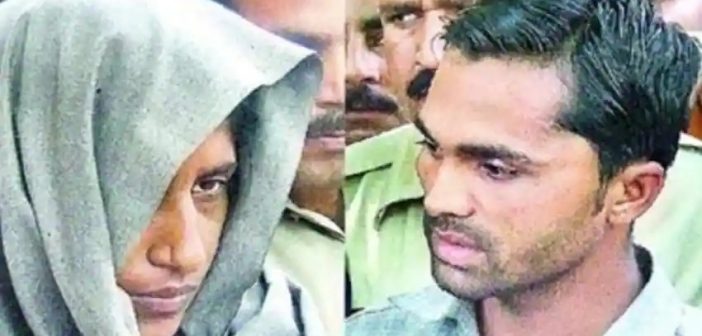By Amita Verma
Lucknow, June 3 (IANS) It was a sultry April morning in 2008 when wails rent the air in Bawankhedi village in Uttar Pradesh’s Amroha district.
Shaukat Ali’s daughter Shabnam frantically ran from house to house, crying out aloud.
As neighbours rushed in, they were shocked to find the bodies of seven family members, including a ten-month-old baby, lying on the floor.
The deceased included Shabnam’s father Shaukat Ali ,55, mother Hashmi, 50, elder brother Anees, 35, Anees’s wife Anjum, 25, younger brother Rashid, 22, cousin Rabia, 14, and Arsh — the 10-month-old son of Anees.
Shabnam, belonging to the Saifi Muslim community, initially claimed that unknown assailants had entered her home and killed everyone.
However, when the police grilled her, she could not give a satisfactory reply about how she escaped the assailants.
Murmurs in the village also began about Shabnam’s relationship with Salim that had been strongly opposed by her family.
Finally, after five days of interrogation, Shabnam broke down and confessed that she and Salim had killed her family.
She told the police that she had made her family members drink milk laced with sedatives, before killing them along with her lover.
Seven members of the family, including a 10-month-old child, were axed to death on the night of horror.
Salim chopped their heads off with the axe, while Shabnam held them by their hair. She throttled her 10-month-old nephew.
With the rest of her family dead, Shabnam would have been the sole heir to their house and other property.
When Shabnam and Salim were arrested five days after the crime, they were both in their 20s, and Shabnam was seven weeks pregnant.
Later in 2008, she gave birth to a son.
A post-graduate in two subjects, English and Geography, she had worked as a shiksha mitra (government school teacher). Her family was opposed to her relationship with Salim, a Class 4 dropout, who worked at a wood sawing unit outside their home and belonged to the Pathan community.
Interestingly, during the trial, the couple turned against each other.
The 2015 Supreme Court judgment says that in her Section 313 statement, Shabnam said Salim had entered the house with a knife through the roof and killed all her family members while she was asleep.
Salim, on the other hand, said he reached the house “only on the request of Shabnam” and that when he reached there, she confessed to having killed the others.
In 2010, an Amroha sessions court sentenced them to death, which was upheld by the Allahabad High Court in 2013 and the Supreme Court in May 2015.
Within 10 days, however, the apex court stayed the death warrants.
In September 2015, then Uttar Pradesh Governor Ram Naik rejected Shabnam’s plea for mercy, which she had sought on the ground of her responsibilities towards her son, Mohammad Taj.
In August 2016, then President Pranab Mukherjee rejected her mercy petition.
In January 2020, a Supreme Court bench headed by Chief Justice SA Bobde upheld the death sentence.
Both Shabnam, 37, and Saleem, 35, are currently on death row for the crime after the Supreme Court upheld their punishment.
If Shabnam is executed, she will be the first woman in Independent India to be hanged for a crime.
Another angle to this crime of passion is the property owned by Shabnam’s family.
Shabnam’s son Taj Mohammad, whom she delivered in jail, was born out of wedlock and is unlikely to have any claim to the immense property that her family owned.
Valued in crores, the property is one of the biggest estates in Bawankhedi and has allegedly emerged as a bone of contention between the extended Ali clan.
Shaukat’s brother Sattar, who owns half the property, now lives there with his family but claims to have received threats from distant relatives who have their sights set on it.
Shabnam’s son has been adopted by her college friend Usman Saifi.
Saifi says the property ought to be given away in charity. “Nothing good can come out of it,” he said.
Meanwhile, legal experts claim that before she is hanged, Shabnam still has some legal remedies left to her.
Shabnam’s lawyer, Advocate Shreya Rastogi, said in a statement, “Shabnam has very important constitutional remedies that remain to be exercised. These include the right to challenge the rejection of her mercy petition before the Allahabad High Court and the Supreme Court on various grounds and also the right to file a curative petition in the Supreme Court against the decision on the review petition.”
Also, under the law, if multiple people have been sentenced to death in the same case, they have to be executed together. So, Shabnam and Salim can be hanged only after both of them exhaust all their legal recourses.
Shabnam’s uncle and aunt have expressed happiness at the court verdict.
“We were not at home when the carnage took place. When we went there in the morning, there was blood all around and the bodies were cut up. The crime was unpardonable,” said her uncle.
He said that he would not accept the body of Shabnam after her hanging.
–IANS
amita/bg






